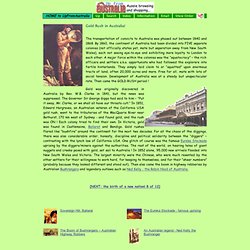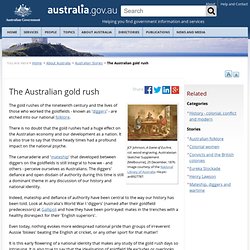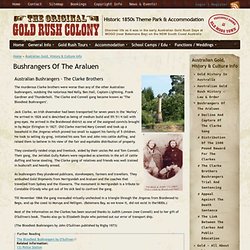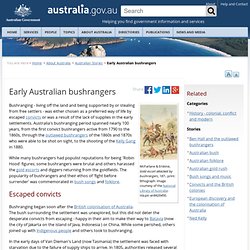

Gold Rush in Australia! The transportation of convicts to Australia was phased out between 1840 and 1868.

By 1860, the continent of Australia had been divided into FIVE separate colonies (not officially states yet, mate but seperation away from New South Wales), each not seeing eye-to-eye and exhibiting more loyalty to London to each other. A major force within the colonies was the “squatocracy” – the rich officers and settlers a.k.a. opportunists who had followed the explorers into fertile hinterlands. They simply laid claim to or “squatted” upon enormous tracts of land, often 20,000 acres and more. Free for all, mate with lots of social tension. Development of Australia was at a steady but unspectacular rate. Gold was originally discovered in Australia by Rev. [NEXT: the birth of a new nation! Australian Bushrangers. The Australian gold rush. JCF Johnson, A Game of Euchre, col. wood engraving, Australasian Sketcher Supplement [Melbourne], 25 December, 1876.

Image courtesy of the : nla.pic-an8927787. The gold rushes of the nineteenth century and the lives of those who worked the goldfields - known as '' - are etched into our national . There is no doubt that the gold rushes had a huge effect on the Australian economy and our development as a nation. It is also true to say that those heady times had a profound impact on the national psyche. The camaraderie and '' that developed between diggers on the goldfields is still integral to how we - and others - perceive ourselves as Australians. Indeed, mateship and defiance of authority have been central to the way our history has been told. Even today, nothing evokes more widespread national pride than groups of irreverent Aussie 'blokes' beating the English at cricket, or any other sport for that matter! The discovery that changed a nation Gold frenzy A nation transformed Racism Gold Rush.
Australian Gold, History & Culture Info - Historic Gold Rush Village Mogo South Coast NSW Australia. The murderous Clarke brothers were worse than any of the other Australian bushrangers, outdoing the notorious Ned Kelly, Ben Hall, Captain Lightning, Frank Gardiner and Thunderbolt.

The Clarke and Connell gang became known as "The Bloodiest Bushrangers". Jack Clarke, an Irish shoemaker had been transported for seven years in the "Morley". He arrived in 1826 and is descirbed as being of medium build and 5ft 51/4 tall with grey eyes. He arrived in the Braidwood district as one of the assigned convicts brought in by Major Elrington in 1827. Old Clarke married Mary Connell and took up a leasehold in the Jingeras which proved too small to support his family of 5 children. They constantly raided crops and livestock, aided by their uncles Pat and Tom Connell. As bushrangers they plundered publicans, storekeepers, farmers and travellers. Till November 1866 the gang marauded virtually unchecked in a triangle through the Jingeras from Braidwood to Bega, and up the coast to Moruya and Nelligen. Early Australian bushrangers. McFarlane & Erskine, Gold escort attacked by bushrangers, 187-, print: lithograph.

Image courtesy of the : nla.pic-an8420450. Bushranging - living off the land and being supported by or stealing from free settlers - was either chosen as a preferred way of life by escaped or was a result of the lack of supplies in the early settlements. Australia's bushranging period spanned nearly 100 years, from the first convict bushrangers active from 1790 to the 1860s, through the of the 1860s and 1870s who were able to be shot on sight, to the shooting of the in 1880. While many bushrangers had populist reputations for being 'Robin Hood' figures; some bushrangers were brutal and others harassed the and diggers returning from the goldfields. The popularity of bushrangers and their ethos of 'fight before surrender' was commemorated in and . Escaped convicts Bushranging began soon after the .
The first bushrangers, 1790s - 1820s Martin Cash - 'The only bushranger to die in his own bed', 1820 - 1840s 1. 2.